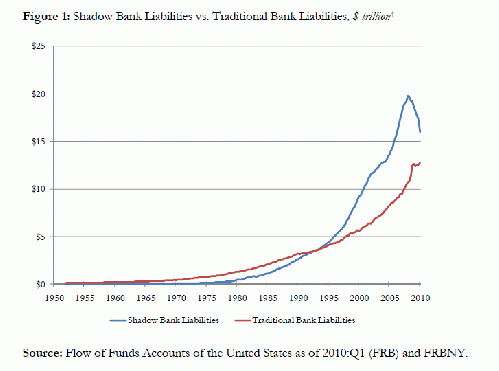Rather than expanding the money supply, quantitative easing (QE) has actually caused it to shrink by sucking up the collateral needed by the shadow banking system to create credit. The "failure" of QE has prompted the Bank for International Settlements to urge the Fed to shirk its mandate to pursue full employment, but the sort of QE that could fulfill that mandate has not yet been tried.
Ben
Bernanke's May 29th speech signaling the beginning of the end of QE3 provoked a
"taper tantrum" that wiped about $3 trillion from global equity markets -- this
from the mere suggestion that the Fed would moderate its pace of asset
purchases, and that if the economy continues to improve, it might stop QE3 altogether
by mid-2014. The Fed is currently buying $85 billion in US Treasuries and
mortgage-backed securities per month.
The
Fed Chairman then went into damage control mode, assuring investors that the central
bank would " continue to implement
highly accommodative monetary policy " (meaning interest rates would not
change) and that tapering was contingent on conditions that look unlikely this
year. The only
thing now likely to be tapered in 2013 is the Fed's growth forecast.
It
is a neoliberal maxim that "the market is always right," but as former World
Bank chief economist Joseph Stiglitz demonstrated, the maxim only holds when
the market has perfect information. The market may be misinformed about QE,
what it achieves, and what harm it can do. Getting more purchasing power into
the economy could work; but QE as currently practiced may be having the
opposite effect.
Unintended
Consequences
The
popular perception is that QE stimulates the economy by increasing bank
reserves, which increase the money supply through a multiplier effect. But as shown earlier here, QE is just an
asset swap -- assets for cash reserves that never leave bank balance sheets. As University
of Chicago Professor John
Cochrane put it in a May 23rd blog:
QE is just a huge open
market operation. The Fed buys Treasury securities and issues bank reserves
instead. Why does this do anything? Why isn't this like trading some red
M&Ms for some green M&Ms and expecting it to affect your weight? . . .
[W] e have
$3 trillion or so [in] bank reserves. Bank reserves can only be used by banks,
so they don't do much good for the rest of us.
While the reserves may not do much for the economy, the Treasuries
they remove from it are in high demand. Cochrane discusses a May 23rd Wall
Street Journal article by Andy Kessler titled "The
Fed Squeezes the Shadow-Banking System," in which Kessler argued that QE3
has backfired. Rather than stimulating the economy by expanding the money
supply, it has contracted the money supply by removing the collateral needed by
the shadow banking system. The shadow system creates about half the credit
available to the economy but remains unregulated because it does not involve
traditional bank deposits. It includes hedge funds, money market funds,
structured investment vehicles, investment banks, and even commercial banks, to
the extent that they engage in non-deposit-based credit creation.
Kessler wrote:
[T]he Federal
Reserve's policy--to stimulate lending and the economy by buying Treasurys--is
creating a shortage of safe collateral, the very thing needed to create credit
in the shadow banking system for the private economy. The quantitative easing
policy appears self-defeating, perversely keeping economic growth slower and
jobs scarcer.
That explains what he calls the great economic paradox of our time:
Despite
the Federal Reserve's vast, 4 --year program of quantitative easing, the economy
is still weak, with unemployment still high and labor-force participation down.
And with all the money pumped into the economy, why is there no runaway
inflation? . . .
The explanation lies in the distortion that Federal Reserve policy
has inflicted on something most Americans have never heard of:
"repos," or repurchase agreements, which are part of the equally
mysterious but vital "shadow banking system."
The way money and credit are created in the economy has
changed over the past 30 years. Throw away your textbook.
(Note: You can view every article as one long page if you sign up as an Advocate Member, or higher).






